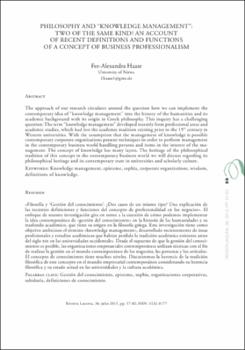Philosophy and “Knowledge Management”: Two of the Same Kind? An Account of Recent Definitions and Functions of a Concept of Business Professionalism
Author
Haase, Fee-AlexandraDate
2015Abstract
El enfoque de nuestra investigación gira en torno a la cuestión de cómo podemos implementar la idea contemporánea de «gestión del conocimiento» en la historia de las humanidades y su trasfondo académico, que tiene su origen en la filosofía griega. Esta investigación tiene como objetivo ambicioso el término «knowledge management», desarrollado recientemente de áreas profesionales y estudios académicos que habían perdido la tradición académica existente antes del siglo xix en las universidades occidentales. Desde el supuesto de que la gestión del conocimiento es posible, las organizaciones empresariales contemporáneas utilizan técnicas con el fin de realizar la gestión en el mundo contemporáneo de los negocios, las personas y los artículos.
El concepto de conocimiento tiene muchos niveles. Discutiremos la herencia de la tradición filosófica de este concepto en el mundo empresarial contemporáneo considerando su herencia filosófica y su estado actual en las universidades y la cultura académica. The approach of our research circulates around the question how we can implement the contemporary idea of “knowledge management” into the history of the humanities and its academic background with its origin in Greek philosophy. This inquiry has a challenging question: The term “knowledge management” developed recently from professional areas and academic studies, which had lost the academic tradition existing prior to the 19th century in Western universities. With the assumption that the management of knowledge is possible contemporary corporate organizations present techniques in order to perform management in the contemporary business world handling persons and items in the interest of the management.
The concept of knowledge has many layers. The heritage of the philosophical tradition of this concept in the contemporary business world we will discuss regarding its philosophical heritage and its contemporary state in universities and scholarly culture.





